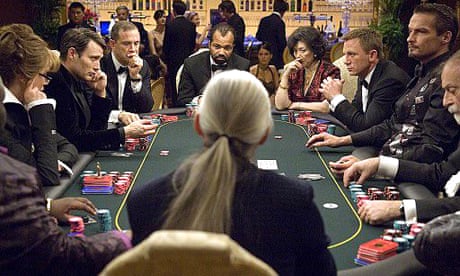The winner of the main event of the World Series of Poker Europe, which started last week and which players pay £10,000 to enter, will not be a poker bot.
Even if one could enter, no-limit Texas Hold'em at this level is beyond current levels of processing power and research. But in July, programs developed by the University of Alberta's Computer Poker Research Group, just about licked a team of top poker professionals.
This was the first tournament victory against professionals for Polaris, the collective name for the Research Group's bots. The score was close: three wins to Polaris, two to the pros, and one draw.
Military intelligence
Poker offers a well-defined domain in which to investigate some fundamental issues in computing science, such as how to handle deliberate misinformation and how to make intelligent guesses based on partial knowledge. The obvious applications - besides poker tournaments - are business and the military.
A byproduct of this is that technology will improve standards of play in poker. "Computer programs are going to teach a ton of stuff to humans," says Dr Darse Billings, former lead architect of the University of Alberta's poker software bots and now consultant to the project. "Humans don't actually play poker very well." There are precedents: backgammon was transformed once computer analysis revealed that intuitive strategies were wrong; and chess openings have also changed as a result of computers.
Humans are already learning a lot by developing their poker game with technology. The winner of the World Series is likely to be young: last year's champion, pocketing £1m, was Annette Obrestad, an 18-year-old Norwegian. Grizzled veterans don't dominate because they're outnumbered by younger online players, who can learn much more quickly than the old school ever could. In a casino, a dealer will deal between 30 and 40 hands per hour. Online, it's around 100. Also, most online players play multiple games simultaneously. John Tabatabai, the 22-year-old runner-up in last year's World Series, finds playing six games at a time easy and aims to play 50,000 hands a month.
Online players also hone their skills with computer simulations and data-mining, analysing their own and opponents' play. Programs like PokerTracker track every hand you play, so you can determine optimal starting hands dependent on your position in relation to the dealer and the playing characteristics of your opponents.
This "development by experience" is converging with the ideas and analysis of game theory practitioners. Andy Bloch and Chris Ferguson, who have both won several million dollars as professional players, have developed game theory-based computer simulations to model thousands of poker hands. Ferguson became a big tournament winner with very little tournament experience, because of the edge he'd got. Bloch was a member of one of the MIT blackjack card-counting teams that won millions from the Las Vegas casinos. The story was told in the book Bringing down the House and the film 21.
Most poker games can be converted to linear programs, says Bloch, and then solved using algorithms. Simple game theory is useful for bluffing. He considers a psychological understanding of a poker situation in live play as "an additional variable in the equation - not that I'm actually working out an equation, but sometimes I am".
Ferguson, who has a PhD in computer science from UCLA, has written several research papers on game theory in poker with his father, a maths professor at UCLA. His research shows that the correct hands to bet on are your best and worst hands, and that you should bet on your bad hands approximately one third of the time. Which, it turns out, is what most successful tournament players do. "The intuitive player comes up with the same strategy in most situations that the mathematical player comes up with. They just come at it differently," Ferguson says.
Don't tell
Bloch and Ferguson are less gung-ho than Billings about computers teaching humans about poker. "I think humans play pretty well," says Ferguson. "They're much better at taking advantage of mistakes by their opponents. Computers aren't very good at doing that. Computers aren't good at reading tells [unconscious body language indicating how good the player's hand is], but they make up for that by not being readable themselves."
So where does all this leave ordinary online players worried that poker bots will take their money? The work that the Alberta team has put into Polaris should allay some fears - modelling Hold'em involves addressing the quintillion (million million million) states of the game.
However, at a very low online level, bots do play, and they might beat you. But it's estimated it takes about 2,500 programming hours to get an off-the-shelf bot up to earning £3 an hour.
Says Billings: "If there are programmers who are really sharp, at both programming and poker, then it is conceivable to write a bot that can win. But someone that smart can take a hell of a lot more money legitimately than by writing a poker bot."
